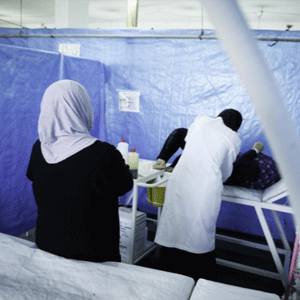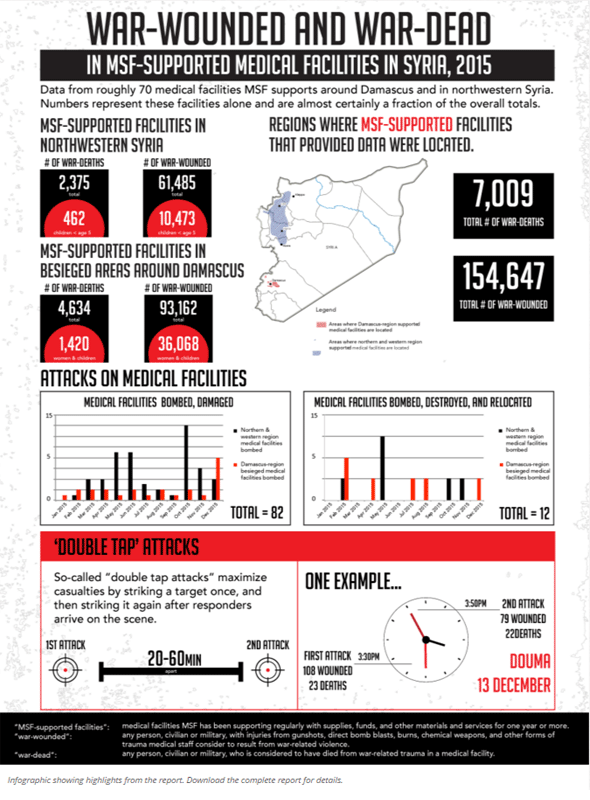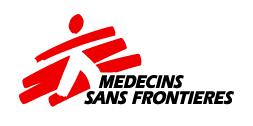
I graduated in 1995 and opened up a clinic on October 10th, 1995. In 2001, I specialised in urology.
Patients are afraid to come
There were around 40,000 residents in the area before "the events" [Syrian uprising 2011]. Now, the population here, including the displaced, is around 15,000 individuals.
I work in mainly two clinics. One experienced numerous strikes, and it was closed down and we transferred to the second makeshift clinic, which was also hit a lot.
The last strike against this second clinic was in September 28, 2015. Four people were killed, including a friend of mine who was the director. It was very violent, that strike.
Read: Critical drug shortages in Syria
We have rebuilt the clinic as we usually do. We’re still lacking the physiotherapy room and the out-patient department is currently just a big room divided between genders, yet the clinic still provides all types of medical services, starting from emergencies, out-patient rooms, surgeries, laboratories, to X-rays, physiotherapy. It is an essential clinic for the Ghouta area.
Patients are afraid to come because of the strikes. They always tell me not to take them to the clinics; they would rather go to centres (smaller health posts) because clinics and hospitals in the area are more likely to be targeted.
One of the patients might be a family member
You see all types of casualties. Just today, as patients were coming in, they were telling me how much I’ve grown in these times; I responded that this is because of the injuries I’ve seen. Because you see patients who lost a leg, their head’s decapitated, their hand cut off.
In the future, the doctors in areas like Ghouta will be considered the most famous in the world because of the extraordinary things they had to do. Because of the limited number of doctors in East Ghouta, and especially in any of the besieged areas, any doctor remaining is forced to play multiple roles.
I am an urologist and a gynaecologist, I’ve done more than 200 C-section surgeries, I’ve done general surgeries, and I’m a paediatrician. I have to do everything.
The hardest moment we face is the fact that when patients are brought in, you have this strange sensation that one of the patients might be a family member. More than that, you see a patient, who you’ve only spoken to five or ten minutes earlier, brought in without a face or head.
This is truly the hardest moment for me.
The worst of times
It is a bit better today, but the years of 2013-2015 were the worst of times.
The situation regarding resources has been improving for the last four months because of the easing of the blockade and aid arrived around 10 days ago with about 53 kilos of goods allocated for each family – the breakdown: 15 kilo flour, 10 kilo rice, 4 kilo burghul, 5 kilo sugar, 6 kilo chickpeas, and a kilo of spaghetti. There were also some medical supplies.
This was brought in by the Syrian Red Crescent. Before this convoy a kilo of sugar was 1,000 Syrian Pounds (R70).
A kilo of bread reached up to 1,200 lira. Now, bread, for example, is priced at 300–350 Syrian Pounds (R20–24). There’s food, there’s fruit! Fruit!
Last year, I remember, I had bought 4 oranges for 3,000 pounds for my children. There are still limited medical supplies, but not as bad as before.
You can say that we’ve currently reserved about 50-60 percent of our needed medical supplies. Two years ago, in comparison medicine was 2000 – 2,500 Pounds now it is 900 Pounds.
They simply want to violence to stop
Yet in the context of this war, it is still very bad. There are always planes, always injuries, casualties, dead. Everyone is fatigued with the fear and deaths.
People all wanted freedoms, wanted the revolution to persist, but now they have reached a point where they simply want the violence to stop. Everyday someone says goodbye to a relative.
Every day there was fear. I was one of the few people who would go out in my car to other areas to work in makeshift clinics. Every time I go out, I would pray because I’m not sure I’ll return to my children.
Read: Ancient parasite highlights humans' role in spread of disease
Yet for the past 5-6 days now, I’m not afraid to go out. This is the first time, in three years, that I feel safe and unafraid of a strike.
Still, we hear the sounds of gunfire. Nearby, there are battles raging and getting closer.
The cessation of violence actually does not exist, but it did decrease violence. You can say the level of violence is around 15 to 20 percent of what it was.
People are still afraid of what will happen after the cessation of violence ends, especially given that a day before the cessation of violence came into effect, we had around 50 strikes onto Ghouta.
It was as if the people bombing us wanted to say a brief goodbye. We are worried that once the cessation ends, the response is going to be harsh.”
Infographic: Showing the stats on war-wounded and war-dead where MSF supported medical facilities in Syria.
Update on the war in Syria, March 2016, marks the start of the sixth year of conflict in Syria, and the humanitarian and medical toll of the violence remains appalling. Millions of Syrians are on the run, displaced in their own country, or seeking refuge abroad.
Millions are trapped in communities under siege or hemmed in by the closed borders of neighbouring countries, already overwhelmed by the numbers of Syrians seeking protection.
The bitter reality is that 4 of 5 UN Security Council permanent member states are complicit, being actively involved in this conflict.
On February 19, a report was shared based on the 2015 data from 69 hospitals showing the results for 154, 647 war-wounded and 7,009 war-dead and clinics that MSF supports in north-western, western and central Syria. We found that between 30 to 40 percent of victims were women and children, showing that violence on civilian areas is happening on a massive scale.
Also read:
Doctors Without Borders (MSF) rescue migrants in distress in the Mediterranean Sea
Red Cross delivers first medical aid in a year to Palestinians in Syria
Hardship on migrants' long journey to Europe
Image: A consultation in the ER section of a MSF hospital in Syria from MSF




 Publications
Publications
 Partners
Partners














